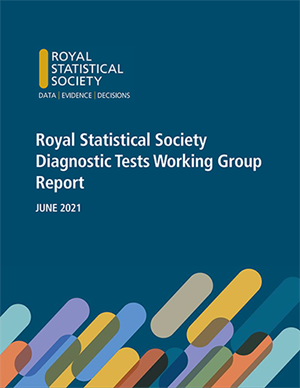The RSS's Working Group on Diagnostic Tests has called for new statistical standards to assure the performance of future diagnostic tests, so we are better prepared for future pandemics.
The Working Group, co-chaired by former RSS President Professor Deborah Ashby and Professor Jon Deeks, was convened last year following concerns that tests were coming to market without sufficient evidence of their performance. The problem has been longstanding but the pandemic and the current use of mass testing has brought it to the fore.
At the moment, diagnostic tests are not held to a common statistical benchmark in either the UK, US, or EU. They are also not required to be evaluated in the settings where they will be used, or for the evidence to be independently scrutinised.
The Working Group's report, published today (9 June 2021), calls on the Medicines and Healthcare Products Regulatory Agency (MHRA) to review and revise the national licensing process for diagnostic tests. It stresses that the assessment of a test’s safety must go beyond just the safety of the device itself, but also include the potentially harmful consequences of false negatives and false positives.
The 90-page report calls for more evidence of how tests perform in different settings; for example, initial claims of the sensitivity of the Innova lateral flow test (LFT) were based on evaluations conducted in laboratory settings in patients with symptoms. However, when they were used by non-healthcare professionals in people without symptoms in mass testing in Liverpool they missed many more cases. Now they are being used by school-children as a self-test, for which no data are available at all.
The report also highlights the importance of the prevalence of a disease in deciding when to change or stop using tests. As a disease becomes rarer, the usefulness of a test decreases, with increasing chances that positive results are false. This had implications for the mass asymptomatic testing in secondary school pupils in England, which we expressed concern about at the time.
The Working Group calls for more transparency around test performance, so that people are aware of the likelihood of incorrect results. False reassurance can lead to greater risk taking and therefore increased transmission.
'Testing has been a key focus of many government’s strategies in fighting Covid, but the lack of statistical standards has caused issues, with tests coming to market without enough known on their effectiveness,' says Deborah Ashby. 'We urge regulators to take on board our recommendations, to allow for more scrutiny of diagnostics more generally and for future pandemics.'
Jon Deeks adds: 'While no one questions the need for an evidence-based approach to vaccines and treatments, the proper assessment of the suitability of Covid-19 tests has been neglected.
'Investment in well-designed studies evaluating tests in the real-world settings where they are used must become standard practice. We must learn from the mistakes made during the pandemic and put in place requirements for stronger science, better regulation and more transparency.'
Find out more about the remit and membership of the RSS Working Group on Diagnostic Tests.

Download the report (PDF)